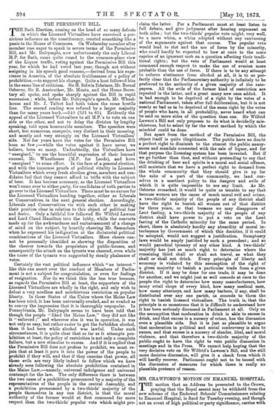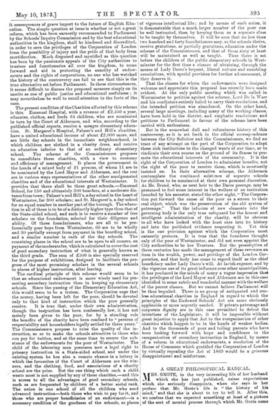MR. CRAWFORD'S MOTION ON EMAN1JEL HOSPITAL.
THE motion that an Address be presented to the Crown, .1_ praying that the Royal assent may be withheld from the new scheme of the Endowed Schools' Commissioners relating to Emanuel Hospital, is fixed for Tuesday evening, and though not an event of high political or party significance, carries with it consequences of grave import to the future of English Edu- cation. The simple question at issue is whether or not a great reform, which has been earnestly recommended to Parliament by the Schools' Inquiry Commission and by the best educational authorities in the kingdom, shall be hindered and discredited, in order to save the privileges of the Corporation of London from the possibility of injury and the pride of that body from mortification. Much disguised and mystified as this question has been by the passionate appeals of the City authorities to trustees and functionaries all over the kingdom, to come forward and aid in protecting the sanctity of endow- ments and the rights of corporations, no one who has watched the history of the controversy can fail to see that this is the true alternative set before Parliament. In these circumstances, it seems difficult to discuss the proposed measure simply on its merits as one of public justice and educational usefulness ; it may nevertheless be well to recall attention to the facts of the case.
The present condition of the Charities affected by this scheme is this. Emanuel Hospital, with a revenue of £2,450 a year, educates, clothes, and feeds 64 children, who are nominated in turn by the Court of Aldermen, and who, according to the published official reports, receive a meagre elementary educa- tion. St. Margaret's Hospital, Palmer's and Hill's charities, have a united educational income of about £2,000 more, and are little day schools in the immediate neighbourhood, in which children are clothed in a charity dress, and receive an education inferior to that of an ordinary elementary
schooL The scheme of the Commissioners proposes to consolidate these charities., with a view to economy and efficiency of management. It places the government in the hands of a mixed body of 21 persons, of whom 11 are to be nominated by the Lord Mayor and Aldermen, and the rest are in various ways representatives of the other amalgamated charities and of the educational interests of Westminster. It provides that there shall be three great schools,—Emanuel School, for 150 and ultimately 300 boarders, at a moderate dis- tance from town ; Palmer's and Hill's, aday school in the heart of Westminster, for 300 scholars; and St. Margaret's, a day school for an equal number in another part of the borough. The educa- tion in all of these is to be of a distinctly higher type than that of the State-aided school, and each is to receive a number of free scholars on the foundation, selected for their diligence and ability. Of these foundationers, who are all to be pre- ferentially poor boys from Westminster, 60 are to be wholly and 30 partially exempt from payment in the boarding school, and a similar number in each of the -day schools. The remaining places in the school are to be open to all comers, on payment of themoderate fee, -vhich is calculated to cover the cost of good secondary instruction of what is generally known as the third grade. The sum of £500 is also specially reserved for the purpose of exhibitions, designed to facilitate the pro- gress of the most promising scholars in the several schools to places of higher instruction, after leaving.
The cardinal principle of this scheme would seem to be that an educational endowment is more wisely used for pro- moting secondary instruction than in keeping up elementary schools. Since the passing of the Elementary Education Act, this would seem to be a truism. The Corporation urge that the money, having been left for the poor, should be devoted only to that kind of instruction which the poor generally receive. It is true that, under their own administration, though the instruction has been confessedly low, it has not mainly been given to the poor, for by a standing rule the benefits of the charity have been confined to "persons of respectability and householders legally settled for three years." The Commissioners propose to raise the quality of the in- struction, so as to make the schools attractive to those who can pay for tuition, and at the same time to secure the sub- stance of the endowments for the poor of Westminster. The child of the labouring man possesses now a legal right to primary instruction in a State-aided school, and under the existing system be has also a remote chance in a lottery in which the favourites of the Court of Aldermen are the win- ners, and the clothing, food, and associations of a charity school are the prize. But the one thing which such a child wants most is not supplied by any of these charities,—and this is access to all the advantages of good secondary schools, such as are frequented by children of a better social rank. The union in one school of all the children who need advanced instruction—both those who wish to pay for it, and those who are proper beneficiaries of an endowment---is a necessary condition of the goodness of the schools, as places of vigorous intellectual life; and by means of such union, it is demonstrable that a much larger number of the poor can be well instructed, than by keeping them as a separate class to be taught by themselves. It will be seen that no less than two hundred and forty foundationers may, as the schools thrive, receive gratuitous, or partially gratuitous, education under the scheme of the Commissioners, and that of them sixty at least will be maintained as well as taught. Thus there is set before the children of the public elementary schools in West- minster for the first time a chance of obtaining, through the means of Lady Deere's bequest, liberal culture and ennobling associations, with special provision for further advancement, if they deserve it.
That the classes for whom the endowments were designed welcome and appreciate this proposal has recently been made evident. At the only public meeting which was called in Westminster to petition against the scheme, Lord De la Warr and his coadjutors entirely failed to carry their resolutions, and the intended petition was abandoned. On the other hand, several large meetings, including many of the working classes, have been held in the district, and emphatic resolutions and petitions to Parliament in favour of the scheme have been carried with enthusiasm.
But in the somewhat dull and voluminous history of this controversy, as it is set forth in the official correspondence between the City Solicitor and the Commissioners, we find no trace of any attempt on the part of the Corporation to adapt these rich institutions to the changed wants of our time, or to vindicate their own course on the ground of its fitness to pro- mote the educational interests of the community. It is the right of the Corporation of London to administer benefits, not the right of the poor to receive them, which is constantly insisted on. In their alternative scheme, the Aldermen contemplate the continued existence of separate schools for children to be nominated at their own personal discretion. As Mr. Brand, who, as next heir to the Dacre peerage, may be presumed to feel some interest in the welfare of an institution founded by his ancestor, stated the other night, "The Corpora- tion put forward the cause of the poor as a screen to their real object, which was the preservation of the old system of patronage." That the infusion of new elements into the governing body is the only true safeguard for the honest and intelligent administration of the charity, will be obvious to all who have looked with the least care into its history and into the published evidence respecting it. Yet this is the one provision against which the Corporation most earnestly protests. It is true that the foundress thought only of the poor of Westminster, and did not even appoint the City authorities to be her Trustees. But the prescription of three centuries has made the management of these revenues an item in the wealth, power, and privilege of the London Cor- poration, and that body has come to regard itself as the chief beneficiary under Lady Deere's will. At lavish expense, and by the vigorous use of its great influence over other municipalities, it has produced in the minds of many a vague impression that the privileges of the Lord Mayor and Aldermen are in this case identified in some subtle and wonderful manner with the welfare of the poorer classes. But we cannot believe Parliament will be thus beguiled. There is no group of antiquated and use- less educational charities in England in regard to which the principles of the Endowed Schools' Act are more obviously applicable or more urgently needed. If private patronage and corporate dignity are in this case permitted to defeat the intentions of the Legislature, it will be impossible without great injustice to apply that Act to the reorganisation of other charities which happen to be in the hands of weaker bodies. And to the thousands of poor and toiling parents who have been looking forward with hope and confidence to the reorganisation of secondary instruction in England, by means of a reform in educational endowments, a resolution of the House of Commons which gratified the Corporation of London by virtually repealing the Act of 1860 would be a grievous disappointment and misfortune.



































 Previous page
Previous page